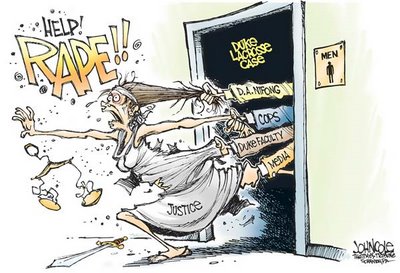Well, Ladies and Gentlemen, I give you exhibit "A": STANDARDS OF PRACTICE FOR INDIGENT DEFENSE COUNSEL
This is an amazing piece of micromanagement. It's not a set of standards or aspirational ideals or anything else; it is micromanagement of every moment of any attorney who agrees to take court appointed cases. Don't believe me? Well, here's the section on the initial meeting with the client:
Standard 2.2 Initial Interview
(a) Preparation for the Initial Interview:
Prior to conducting the initial interview, where possible, counsel should:
(1) Be familiar with the elements of the offense and the potential punishment, where the charges against the client are already known;
(2) Obtain copies of any reasonably available relevant documents, including copies of any charging documents, pretrial release services agencies' recommendations and reports concerning pretrial release, and law enforcement reports;
(3) Be familiar with the legal criteria for determining pretrial release and the protocol in setting those conditions;
(4) Be familiar with the different types of pretrial release conditions the court may set and whether private or public agencies can act as a monitor during the client's release;
(5) Be familiar with any procedures available for reviewing the trial judgeÂ?s decision regarding bail.
(b) The Interview:
(1) The purpose of the initial interview is both to acquire information from the client concerning pretrial release and also to provide the client with information concerning the case. Counsel should interview the client in an environment that protects the attorney-client privilege. Counsel should remove at this, and at all successive interviews and proceedings, barriers to communication, such as differences in language or literacy.
(2) In appropriate cases, counsel should pursue the appointment of interpretive services to assist with communication.
(3) Information counsel should acquire includes, but is not limited to:
(A) The clientÂ?s ties to the community, including the length of time he or she has lived at the current and former addresses, current contact information, family relationships, immigration status (if applicable), employment record and history, date of birth, and social security number;
(B) The client's physical and mental health, educational and armed services records;
(C) The client's immediate medical needs, including chemical dependency treatment;
(D) The client's past criminal record, if any, including adult criminal convictions and juvenile adjudications and prior record of court appearances or failure to appear in court; counsel should also determine whether the client has any pending charges, whether the client is on probation or parole, and the clientÂ?s past or present performance under supervision;
(E) The ability of the client to meet any financial conditions of release;
(F) The names of individuals or other sources that counsel can contact to verify the clientÂ?s provided information (counsel should consult with the client before contacting these individuals);
(G) And other such information necessary to determine potential exposure under the sentencing guidelines;
(H) Any necessary information waivers or releases that will assist the clientÂ?s defense.
(4) Information counsel should provide to the client includes, but is not limited to:
(A) An explanation of the attorney-client privilege and instructions not to talk to anyone about the facts of the case without first consulting with the counsel;
(B) Warning the client of the dangers related to the search of the clientÂ?s cell and personal belongings while in custody, and that jail officials may monitor telephone calls, mail, and visitations;
(C) An explanation of the procedures that will be followed in setting the conditions of pretrial release and the consequences of violating any condition of bond or protective orders relative to the case;
(D) An explanation of the type of information that a pretrial release agency will request in any interview, and an explanation that the client should not make statements concerning the offense;
(E) The charges and the potential penalties;
(F) A general procedural overview of the anticipated progression of the case;
(G) The names of any other persons who may contact the client on counselÂ?s behalf;
(H) Explaining the importance of maintaining contact with counsel, and notifying counsel of any changes to the client's address.
(c) Supplemental Information:
Whenever possible, counsel should use the initial interview to gather additional information relevant to defense preparation. Such information may include, but is not limited to:
(1) The facts surrounding the charges against the client;
(2) The clientÂ?s version of arrest, with or without warrant, including whether the police searched the client and if they seized anything; whether the police interrogated the client, and, if so, whether the client gave a statement; the clientÂ?s physical and mental status at the time of any statement; whether arresting officers provided any exemplars, and whether officers performed any scientific tests on the clientÂ?s body or bodily fluids;
(3) Any co-defendantÂ?s name and custodial status;
(4) Any evidence of improper police investigative practices or prosecutorial conduct which affects the clientÂ?s rights;
(5) Any possible witnesses who should be located;
(6) Any evidence that should be preserved;
(7) Where appropriate, evidence of the clientÂ?s competence to stand trial and/or mental state at the time of the offense, including the clientÂ?s releases for any records for mental health treatment or testing for mental retardation.
And it's not the only section like that - the whole thing is filled with checklists. Basically, it's a setup. Anyone who has done indigent defense (or any kind of defense for that matter) knows what questions to ask in each particular interview, what papers to file in each case, and what procedure applies in the courts wherein he practices. However, with the advent of this series of checklists it becomes impossible to properly defend your client; you will always be in violation of a number of items on the checklist. Don't warn your seemingly intelligent, frequent-flyer client jail phones are monitored? Violation of 2.2(b)(4)(B). Don't ask your client about his military record? Violation of 2.2(b)(3)(B). Don't ask if your obviously withdrawing client is withdrawing (knowing that he can choose from the jail's wide panoply of treatment for withdrawal including cold turkey, cold turkey, and cold turkey)? Violation of 2.2(b)(3)(C).
Everyone who practices indigent criminal defense will have to develop and give out much, much more detailed versions of the two CYA letters I have on the right hand column. And they probably will still spend the entire time they are defending indigents in violation of large numbers of sub-sections of this document. No one with any common sense will even glance at this document as they defend misdemeanants.
Why was this document propagated? To understand that you have to understand an undercurrent in Virginia criminal defense circles. There are a number of lawyers in Virginia who think that Virginia criminal defense attorneys should stop taking indigent cases because they pay so little; basically, they want Virginia defense attorneys to go on strike. True believers who have been preaching this for years, they have not been able to get other attorneys to follow their lead. They believe that ratcheting things up like this will make it impossible for people to continue to represent the indigent at rates which will allow them to keep their doors open.
Standard 1.3 General Duties of Defense CounselAt the very least they will now be able to list the gazillion specified requirements which court appointed attorneys are not fulfilling. This, of course, will finally force the General Assembly to realize the error of its ways and pay appropriate rates. Yeah, right, and I've got some bottom land for sale to anyone who believes it'll work.1
(a) Before agreeing to act as counsel or accepting court appointment, counsel has an obligation to make sure that counsel has sufficient time, resources, knowledge, and experience to offer quality representation to a defendant in a particular matter. If counsel later discovers that counsel cannot provide quality representation, counsel should move to withdraw.
We've already seen one thing the Virginia Indigent Defense Commission did start to fail. The commission set out initial standards which everyone must fulfill to start doing indigent defense including (for felonies) prior representation of four felony cases from the general district court all the way through the appellate process and thereafter the attendance at 6 hours of criminal law CLE's every two years. If you've practiced anywhere outside of a metro area you've seen judges finesse or ignore these rules because to do otherwise would mean they didn't have enough lawyers for the defendants. Now we get to see an unaccomplishable set of checklists set in place which will have to be ignored and will lead to all sorts of fun with clients who will be able to file 100 page habeases listing all the subsections defense counsel didn't fulfill.
Wonderful. Just wonderful. Great job guys.
-------------------
1 Mind you, there are serious problems with the fee caps which need to be fixed. In particular, felonies with mandatory time and any case which goes to a jury needs to have a higher cap. Adopting a system like the feds would probably be a good answer for these things - capping pay for all charges at $2,500 (with upward exceptions per judge's discretion) and requiring the attorney to justify his time via a time sheet.


